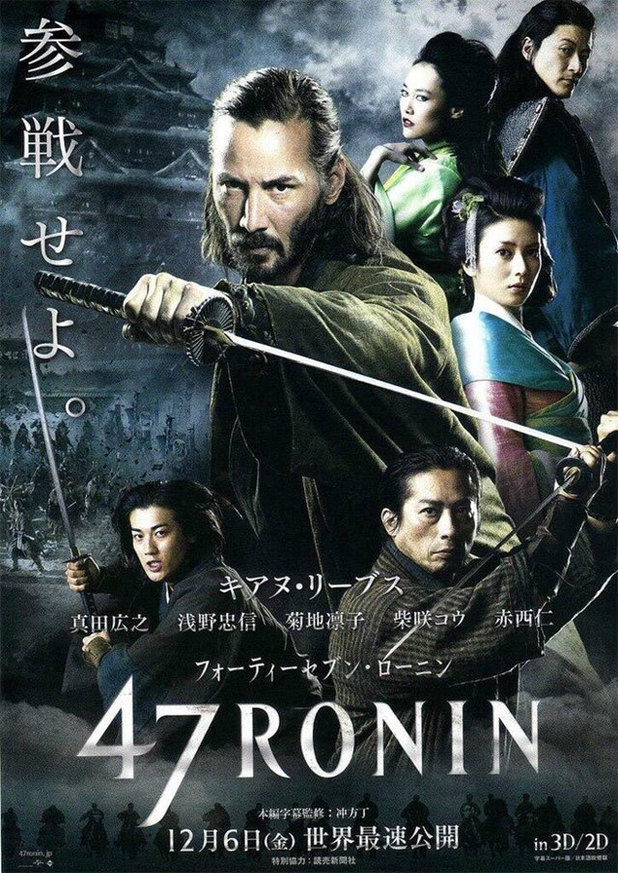 Keanu Reeves stars in “47 Ronin,” which is now playing!
Keanu Reeves stars in “47 Ronin,” which is now playing!
The term Ronin originated in Japan’s feudal period designated a samurai who had either lost his masters favor or was without a master. In his debut feature film and adaptation of the japanese true story of loyalty and endurance Carl Rinsch portrays a group of samurais who after losing their daimyo passionately pursue vengeance and restitution of their honor.
There is an old samurai saying found in the bushido, which describes the next “he who has not been a ronin seven times cannot claim to be a samurai. Stumble and fall seven times, but rise on the eight”. Following the guideline of the art of war “47 Ronin” carries in its essence the real life tale of these destitute samurais, the fantasy action film utilizes the true event as its stepping stone, but while the warriors rise and transform themselves into heroes as described in the legend the movie continuously stumbles upon itself reaching its end with no other purpose than concluding the tale.
If there is anything praiseworthy about Rinsch’s film, we can only find it in its surface. The enchantingly rich costumes, the magnificent set designs, the elegant and distinct photography, the intense yet functional score or the anime flavored CGI, which is one of the films greatest triumphs. This tip of the iceberg proposition, the Hollywood package, may be prove sufficient for viewers that do not wish to look into the sincere teachings the real life story has to offer. It is worth mentioning that the legend of these 47 ronins has been adapted numerous times by among others celebrated japanese filmmaker Mizoguchi who manages a superior adaptation that cannot be compared to this western attempt.
Although well intentioned, Carl Rinsch fails to utilize the material to its full potential and is left with a film that is entertaining up to a certain degree, but definitely not enlightening. Some of the liberties scriptwriters Chris Morgan and Hossein Amini (“Fast & Furious” and “Snow White and the Huntsman”) took while adding make up to the adaptation is the fantasy portion in the film. Kai played by Keanu Reeves serves as the main protagonist of the film, it is through his past that the story is introduced to the viewer. Reeves character not only possesses special powers, but is also said to be half demon. This digression from the 18th century Japanese legend is one of the movies fatal mistakes not on account of the fantastic aspect, but because while paying attention to a single character, it confounds its way loosing track of the story of the samurais, those courageous wandering men described in the title.
It takes time to build the psychology of a group of individuals, to bring to life each and every single ronin or at least those who we may believe stand out, after all it took Akira Kurosawa 207 minutes to successfully elaborate seven credible samurais in his classic film “Seven Samurais.” One of “47 Ronin’s” biggest issues is in fact that it does not attempt to develop any particular character, Kai, Mika (Kou Shibasaki), Lord Kira (Tadanobu Asano) and even Mizuki (Rinko Kikuchi) are presented in their elementary form, they fulfill their purpose within the narrative, but are far from leaving an everlasting impression on the audience. Another example of this can bee seen in the few ronins which are given an active role in the film. We recognize Kai’s childhood rival or the charismatic overweight samurai within the group, but there participation is scarce, indulgent.
To those who admire CGI and feel an unpretentious desire to enjoy a film that utilizes all the tricks in the Hollywood manual “47 Ronin” may be enough. This audience will certainly approve of the great story of courage, sprinkled with a unsatisfying romantic subplot and an extra additive of fantasy. Those desiring to go deep into japanese culture or wish to be blown away by the progress of a group of brave men and their epic journey from ronins to samurais may leave disappointed.
-Gaston Yvorra

10 Comments
Film Review: ’47 Ronin’ : TheSource vkpkksu moncler outlet online italia
Film Review: ’47 Ronin’ : TheSource ulgdjjf ghd lisseur leopard
Film Review: ’47 Ronin’ : TheSource cmcuzs uggs on sale kids
Film Review: ’47 Ronin’ : TheSource svzsxic ceinture louis vuitton pas cher
Film Review: ’47 Ronin’ : TheSource xrottmr ugg soldes femme
Film Review: ’47 Ronin’ : TheSource idagdxchcw louis vuitton sac a main
Film Review: ’47 Ronin’ : TheSource mbotudsvr vetement louis vuitton pas cher
Film Review: ’47 Ronin’ : TheSource quazciyxn magasin ugg france
Film Review: ’47 Ronin’ : TheSource rkggihuaz vetement louis vuitton pas cher
8-863-210-73-62, centrilv.uphero.com centrilv.besaba.com